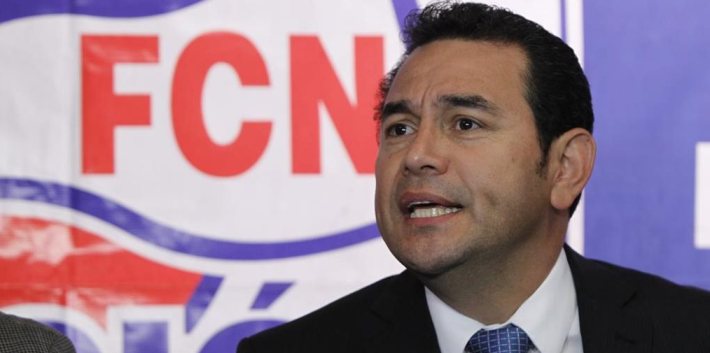
EspañolJimmy Morales is the new president of Guatemala, to the surprise of very few. A comedian with practically zero experience in politics, he won the runoff in a landslide on Sunday, October 25.
The runner-up, Sandra Torres, had lousy credentials. Abuse of power was her signature during her tenure as first lady in the Álvaro Colom administration (2008-2012), and her public image had become tainted by several corruption scandals.
However, if we consider the history of Guatemalan presidential elections, this outcome should raise more than a few eyebrows. Morales’s victory could very well signal the winds of change for Guatemalan politics.
[adrotate group=”8″]
It’s worth remembering that a few months ago, Sandra Torres, and before her Manuel Baldizón, led the race. Both of these candidates represented the traditional, populist politics of handouts in exchange for votes, and vowed to expand such policies if elected.
During the administrations of Colom and the now jailed Otto Pérez Molina, the presidency and a significant part of Congress became little more than mechanisms to reap personal benefits, allowing the ruling party to amass wealth while expanding so-called social programs to secure the rural population’s support.
Starting in April, when a resolute Attorney’s General Office and the International Commission against Impunity in Guatemala (CICIG) decided to investigate a massive corruption scheme within the government, something began to radically change.
Guatemalan citizens seized the opportunity and launched a vigorous and spontaneous social movement against corruption, which rejected Torres and Baldizón, and gravitated towards Morales, the candidate least associated with traditional politics.
In the first round of the presidential election, Baldizón came in third, despite throwing vast sums of money into his campaign. His fall suggested that a new way of doing politics in Guatemala was underway, and led many to anticipate who the next president would be well before the runoff.
It’s not the first time that a candidate with no political experience takes high office in Latin America. In Peru, Alberto Fujimori defeated the liberal novelist Mario Vargas Llosa in 1990, and adopted his rival’s proposals as his own.
Faced with political crisis, when tax hikes and government debt being used to fund a vast network of cronyism and corruption becomes unbearable, people will choose to break with traditional politics and give new candidates a chance.
In the case of Morales, there is even more reason to be optimistic, since it appears that Guatemalans are willing to remain vigilant and demand that the new president oversee a more efficient and more transparent government. Guatemalans want real change.
If we consider what is going on in the rest of the continent, there is hope that Latin American has reached a turning point. In Argentina, for example, voters have dished out a hard blow against President Cristina Kirchner’s appointed successor.
Furthermore, polls show that Brazilians and Chileans hold a largely unfavorable view of their progressive governments, and in Mexico and Honduras, the public is growing more suspicious of socialist movements. Throughout Latin America, those who promise welfare programs in exchange for votes are no longer succeeding. Corruption is no longer a tolerable trade-off.
Latin America’s future is not predetermined. A good part of it will depend on how well these civic movements remain focused on punishing demagogues for using state power for their own benefit. At the very least, there is an evident change in attitudes that is occurring, and a potential shift towards the sort of politics that favor more transparent governance, individual liberties, and economic growth.
 Versión Español
Versión Español












